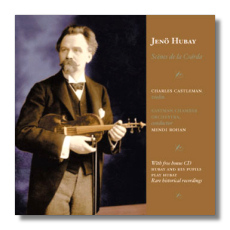
The Internet's Premier Classical Music Source
Related Links
- Hubay Reviews
- Latest Reviews
- More Reviews
-
By Composer
-
Collections
DVD & Blu-ray
Books
Concert Reviews
Articles/Interviews
Software
Audio
Search Amazon
Recommended Links
Site News
 CD Review
CD Review
Jenő Hubay

Scènes de la Csárda (excerpts)
Charles Castleman, violin
Eastman Chamber Orchestra/Mendi Rohan
Music & Arts CD-1164(2) DDD/AAD stereo/mono 2CDs: 68:11, 65:45
This unusual pair of CDs will have violin fanciers drooling. Jenő Hubay's music is not frequently played, except as encores or as part of a program of works by other composers. It is difficult to say whether it was as a violinist, a composer, or as a pedagogue in which he was the most accomplished, but today, Hubay is remembered mostly for the younger violinists of the "Hungarian violin school" who studied under him - Joseph Szigeti, Emil Telmányi, Jelly D'Arányi, and Franz von Vecsey, among others. (And then there was a young violinist named Jenő Blau, who came to the United States and became known as Eugene Ormandy.)
Hubay was born in Budapest in 1858, the son of an excellent violinist connected with the city's National Theater and conservatory. After studies with his father, he went to Berlin, where he was accepted as a pupil by the great Joseph Joachim. After returning to Hungary, he concertized with Franz Liszt (almost 50 years his senior!). Later, he went to Paris and Brussels, but eventually he returned to Budapest, where he devoted his attentions to teaching and composing. He died in 1937.
Scènes de la Csárda (a Csárda is a tavern) were written over several decades - first for violin and piano, and later orchestrated by Hubay himself. There are fourteen of them, but it is unusual to hear them as a set. Violinist Charles Castleman has selected eight of them for this CD. They are intensely nationalistic in style, and Hubay either took the melodies directly from Hungarian folk music, or created his own echt -Hungarian originals. If you want to know about the Hungarian soul and its extremes, you need look no further than the Scènes de la Csárda. They sob and they wail, but after they get a little red wine into them, as it were, they are transformed into dancing whirlwinds of unstoppable kinetic excitement.
Castleman, like Hubay, has divided his time between pedagogy and performing. He is the chair of the string department at the Eastman School of Music, and he founded The Quartet Program at Bucknell University. His relatively infrequent recordings - often of underplayed and terribly difficult music - are always noteworthy. This one is no exception. I suspect the only way Castleman could exceed his achievement here would be if he were born a Hungarian! Although capable of facing Hubay's challenges head-on, he is a musician before he is a virtuoso. That distinction is what makes this music sound as good as it does. Castleman treats it with respect - and with affection too - rather than as an opportunity to show off, and its stature is increased accordingly. The accompaniments by the Eastman Chamber Orchestra have real period character. The complete set of Scènes has been recorded by Hyperion, and Hungaroton also has a complete Hubay edition, but Castleman's collection probably is the best way for interested listeners to dive into Hubay's collection in all its varied glory without breaking the bank.
But that's not all. There's a bonus disc which includes 15 fabulously rare recordings of Hubay's music as played by Hubay's pupils, and by Hubay himself. Many of the selections come from Scènes de la Csárda, and there are other short pieces in Hubay's "cosmopolitan" style too. In addition to the aforementioned Szigeti, Telmányi, D'Arányi, and Vecsey, there are recordings by Harry Solloway, Ibolyka Zilzer, Ibolyka Gyárfás, Mary Zentay, and Duci de Kerekjárto. Dates are not supplied in every case, but some recordings date back to the 1910s, or even earlier. Of course the oldest recordings are noisy, but there's nothing here that isn't fascinating and worthwhile, and also of considerable historical value. Bravo to Music and Arts Programs of America for putting this two-disc collection together!
Copyright © 2005, Raymond Tuttle




















